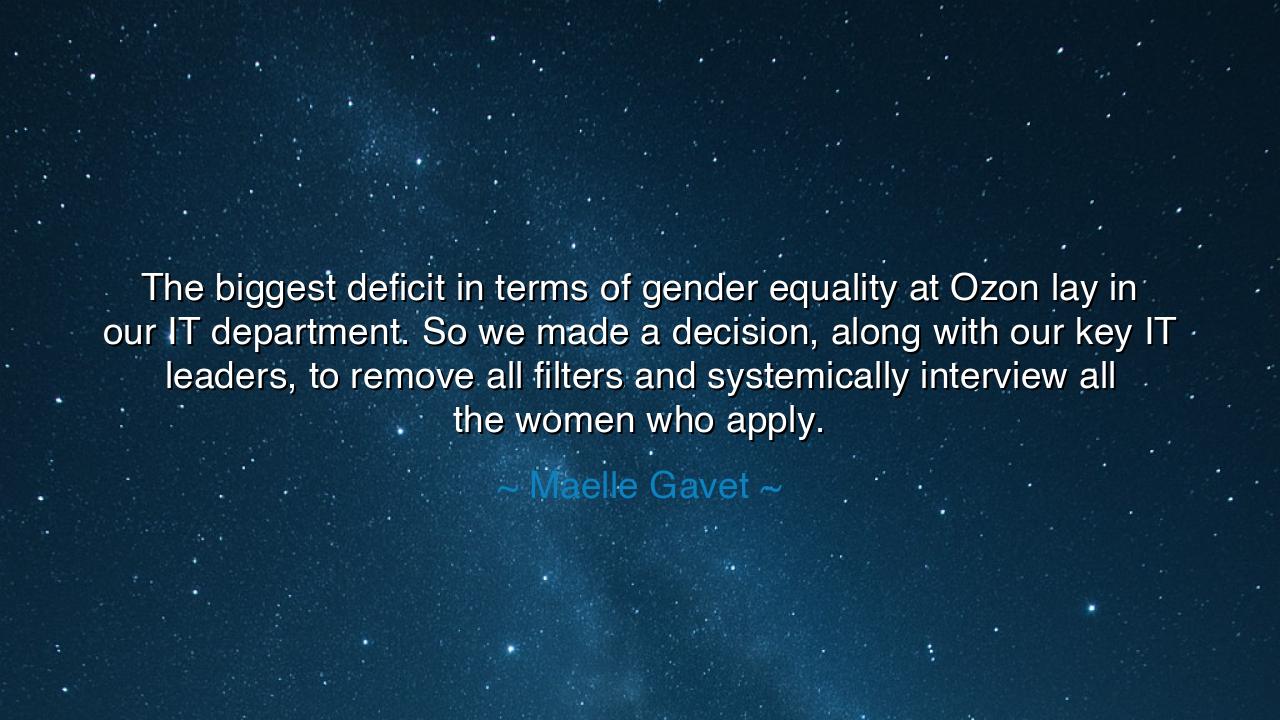
The biggest deficit in terms of gender equality at Ozon lay in
The biggest deficit in terms of gender equality at Ozon lay in our IT department. So we made a decision, along with our key IT leaders, to remove all filters and systemically interview all the women who apply.






“The biggest deficit in terms of gender equality at Ozon lay in our IT department. So we made a decision, along with our key IT leaders, to remove all filters and systemically interview all the women who apply.” — Maelle Gavet
In these wise and forward-looking words, Maelle Gavet, a visionary business leader and advocate for equality, illuminates one of the most persistent challenges of the modern age — the imbalance of opportunity between men and women in the world of technology. Her words are not a mere reflection of corporate policy, but a declaration of principle — that true equality cannot be achieved by silence or neutrality, but through intentional action. In speaking of removing “filters,” she exposes how invisible barriers, often disguised as neutrality, have long limited women’s place in innovation. Her decision to interview all the women who apply is both symbolic and practical — a restoration of fairness where bias once lingered unseen.
The ancients understood that justice is not the absence of wrongdoing, but the presence of balance. In the halls of old, philosophers like Plato spoke of harmony as the mark of a just society — where every soul, regardless of birth or form, is allowed to fulfill its highest purpose. Yet in our age of progress and machines, even as humanity reaches for the stars, the voices of half its genius have too often been muted. Gender equality, as Gavet shows, is not merely about numbers; it is about releasing the potential of creation itself. When women are excluded from the heart of technology, the world’s imagination is cut in half.
Gavet’s quote was born from her experience leading Ozon, a major Russian e-commerce company, where she saw firsthand the imbalance within her own organization’s IT department — the beating heart of digital innovation. Her decision to confront this inequity reveals a truth that transcends business: that injustice, when seen clearly, demands not apology but correction. She did not wait for change to happen naturally, for history teaches that equality does not grow on its own — it must be cultivated through courage and reform. By opening the door to every woman applicant, she declared that talent would no longer be measured by tradition, but by truth.
Throughout history, there have been those who recognized that progress depends upon inclusion. Consider the story of Ada Lovelace, the first computer programmer, whose vision in the 19th century foresaw a digital future that the men of her time could scarcely comprehend. Yet, for generations after her, women were shut out of the very field she helped to create. Their exclusion was not due to lack of skill, but to the filters — cultural, social, and institutional — that Gavet speaks of. Her call to remove those filters is thus not new, but a continuation of an ancient struggle: to let wisdom and creativity flow freely, unbound by prejudice.
Her words also reveal an understanding of leadership that mirrors the old virtues of the philosopher-kings. The wise ruler, the ancients said, does not govern by decree alone, but by example. Gavet’s policy did not merely correct an imbalance in hiring; it sent a message to all who worked beside her — that justice begins in the choices of the powerful. By changing the process, she changed perception; by acting with intention, she invited transformation. In her leadership, one hears the echo of an ancient creed: that fairness is not an ideal to be admired, but a discipline to be practiced.
Yet, her words also carry a warning. For bias, though unseen, is stubborn — like a shadow that clings to every age. Systems built upon old assumptions do not yield easily. To “remove all filters” requires not only policy, but vigilance — the willingness to confront one’s own unconscious prejudice. In this, Gavet’s decision is more than managerial; it is moral. It teaches that equality cannot be built upon good will alone, but upon systemic fairness, renewed daily through deliberate choice.
Let this, then, be the lesson drawn from her wisdom: justice must be active, not passive. Those who hold power in any realm — in business, in governance, in learning — must look closely at the structures they inherit, and ask what hidden barriers remain. For the health of a society, like that of a company, depends on the breadth of its inclusion. The world will only reach its true potential when every mind, every heart, and every hand is allowed to build it. As Maelle Gavet reminds us, the first step to equality is not waiting for balance to come — it is to remove the filters and let human possibility, in all its diversity, shine through.






AAdministratorAdministrator
Welcome, honored guests. Please leave a comment, we will respond soon